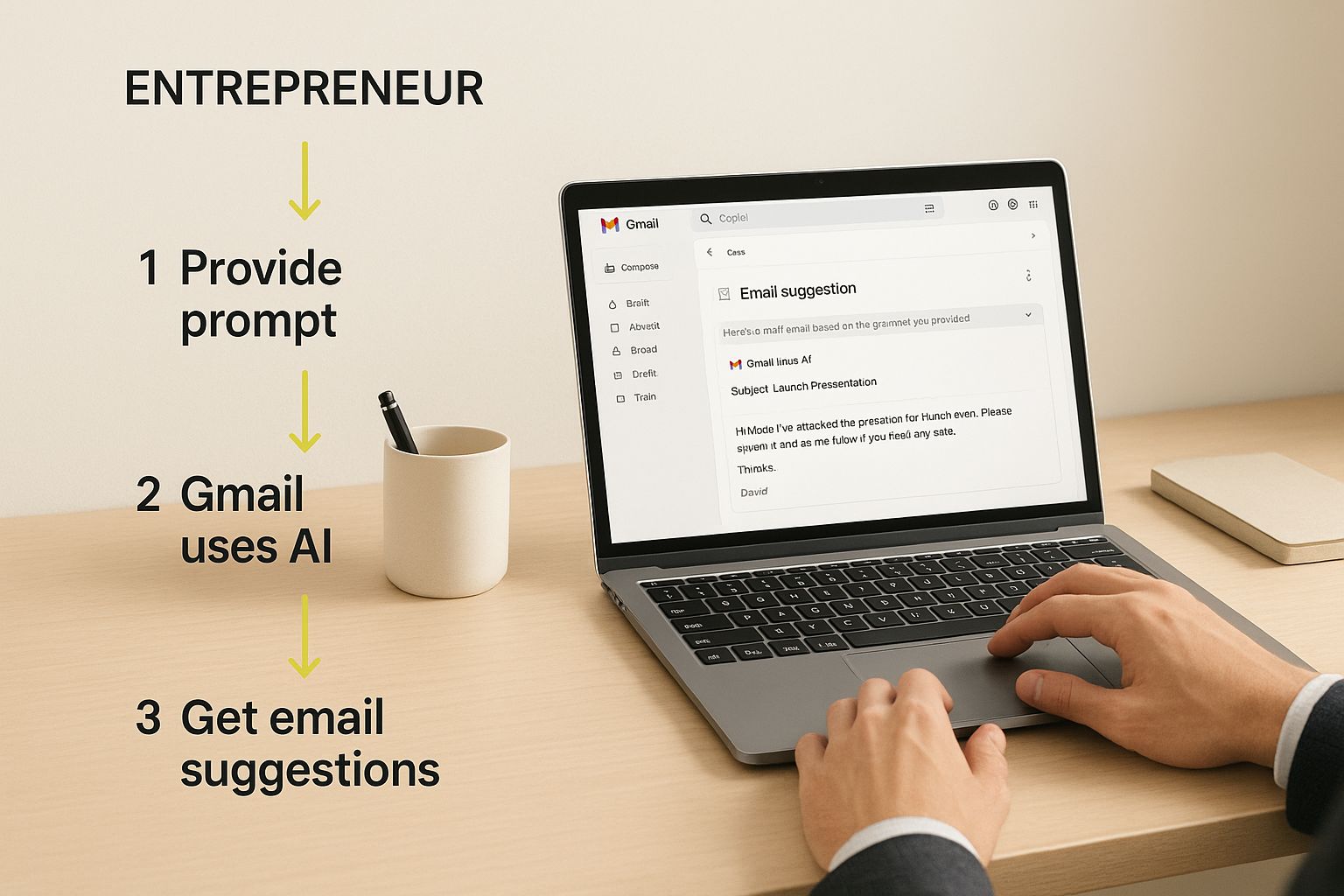
For any UK founder, your inbox is the central nervous system of your business. It’s a relentless flood of investor updates, customer queries, supplier invoices, and operational chatter. The old way of managing this just doesn't cut it anymore.
The solution is what I call The New Founder’s Inbox Zero. It’s not about obsessively deleting emails; it’s a strategic system that uses AI co-pilots like Gemini for Gmail and Copilot for Outlook to build a workflow that does the heavy lifting for you. This playbook will help you turn your inbox from a source of stress into a streamlined command centre.
As a founder or SME owner, your email is more than just a communication tool; it’s where everything happens. It’s where deals are hammered out, partnerships are sealed, and customer relationships are nurtured. But this critical asset can quickly descend into digital chaos.
The sheer volume of messages is the first hurdle. For UK entrepreneurs, email is still the cornerstone of business communication. With over 380 billion messages flying around the country in 2023 and an average return of £35 for every £1 spent on email marketing, its importance is crystal clear. You can dig deeper into these powerful email marketing statistics and see how they impact UK businesses firsthand.
Let’s be honest, traditional inbox management—with its endless folders, manual filters, and flagging—is a losing battle. It’s a reactive approach that forces you to constantly play catch-up, trying to pick out the important signals from the background noise. This constant context-switching drains the mental energy you should be pouring into growing your business.
The goal isn't just to hit an empty inbox by deleting everything in sight. It's about building an intelligent, self-managing system that surfaces what truly matters, automates the mundane, and gives you back your most valuable asset: focus.
This guide introduces a proactive system designed specifically for busy UK founders. We’ll walk through practical playbooks for both Gmail (using Gemini) and Outlook (with Copilot) that will help you:
By putting these strategies into practice, you can finally stop managing your inbox and start using it as a powerful tool to drive your business forward.
Before we dive into the specific steps for Gmail and Outlook, let's get a bird's-eye view of the strategies we'll be covering. This table breaks down the core components of our AI-powered playbook for each platform.
Strategy ComponentGmail with GeminiOutlook with CopilotInitial TriageUse Gemini to summarise long threads and identify action items instantly.Employ "Catch up with Copilot" to get summaries of unread emails.Smart SortingCreate advanced filters and labels suggested by Gemini based on email content.Use Copilot to suggest and create rules for incoming messages.Automated SummariesGenerate quick summaries of important emails directly within the email thread.Get concise summaries of conversations in the Copilot side pane.Drafting RepliesAsk Gemini to draft replies in a specific tone (e.g., formal, friendly).Use "Draft with Copilot" to generate email responses based on prompts.Task ManagementExtract to-dos from emails and send them directly to Google Tasks or Sheets.Ask Copilot to identify action items and create tasks in Microsoft To Do.Meeting SchedulingAsk Gemini to find suitable meeting times based on your calendar availability.Use Copilot's scheduling assistant to coordinate meetings with attendees.
This table gives you a quick snapshot of how you can apply similar AI-driven principles to clean up your inbox, regardless of whether you're a Gmail or Outlook user. Now, let's get into the nitty-gritty.
The first rule of a healthy inbox is knowing what to ignore. For a busy UK founder, not all emails are created equal. An investor update demands a much faster response than a promotional newsletter, right? Your goal is to build a system that automatically surfaces these high-stakes messages, letting you act on them immediately.
This is where your AI copilot steps in as your personal gatekeeper. In Gmail or Outlook, you can set up priority rules that instantly flag, label, or move emails from specific contacts—like key customers or your VC partners—into a dedicated "Priority" folder. It's a simple step, but it ensures their messages never get lost in the daily deluge.
Once you’ve separated the wheat from the chaff, the next challenge is replying with speed and precision. This is where AI-generated templates for Gmail and Outlook become a real game-changer. Instead of hammering out the same replies over and over, you can prompt Gemini or Copilot to create context-aware drafts for common scenarios.
Give these a try:
This approach can seriously improve your first-response time, a crucial KPI for both customer satisfaction and investor relations. You can get a deeper insight into how advanced AI is shaking up business communications in our detailed article on the features and UK business use cases of new AI releases.
This infographic shows just how an entrepreneur can use AI to generate email suggestions right inside their inbox, creating a much cleaner and more efficient workspace.

The image really highlights the seamless way AI can slot into your daily tasks, turning a cluttered inbox into an organised command centre for focused work. These personalised interactions are becoming the norm, not the exception. In fact, AI-driven personalisation is now a cornerstone of successful UK B2B email marketing, shifting the focus from mass mailings to smarter, compliant contact lists.

Let's be honest, the admin tasks lurking in your inbox are silent productivity killers. Invoices, receipts, and scheduling requests quietly drain your most valuable resource: time. This is where you can build a powerful automation engine, turning your email client into a self-organising administrative assistant.
The first step is to tame the digital paper trail. Both Gmail and Outlook have powerful, but often overlooked, features for creating rules that automatically identify and file financial documents. For example, you can set up a rule that spots any email with the word "invoice" or "receipt" in the subject line from a key supplier and instantly moves it to a dedicated "Finance" folder. Simple, but it keeps your primary inbox clean.
This bit of sorting is just the beginning. The real magic happens when you connect your inbox to a dedicated action log.
By linking your email to a tool like Notion using an automation platform (think Zapier or Make), you can create a truly seamless workflow. When an invoice lands in your designated "Finance" folder, an automation can trigger Notion AI to extract key details—like the invoice number, amount, and due date—and push them into a dedicated task database.
This one process transforms a chaotic email archive into an organised, searchable action log. Suddenly, you have a clear overview of your financial commitments without a single minute of manual data entry. Handling the financial side of a growing business is critical, and for a deeper dive into managing your team's pay, you can find more guidance on payroll services for small businesses in the UK.
Another huge time sink is the endless back-and-forth of scheduling meetings. Instead of playing email tennis to find a suitable time, integrate Calendly links directly into your AI-generated reply templates.
When a new lead enquires or a partner requests a chat, your AI-powered template can provide an instant, professional response that includes a direct link for them to book a time in your calendar. This single action eliminates follow-ups and moves conversations forward efficiently.
This simple integration creates a smooth, professional experience for anyone you deal with and, more importantly, frees you from the tedious role of being a meeting coordinator.
Imagine starting your day with a clear list of priorities instead of diving headfirst into a chaotic, reactive inbox. An AI-powered morning briefing completely changes your workflow, letting you tackle the most critical tasks before the daily noise even begins. This is a cornerstone of the modern founder's Inbox Zero playbook.
The process is surprisingly straightforward. You set up a simple automation that links your prioritised email (whether you use Gmail or Outlook) directly to your private Slack channel.
This workflow is designed to run automatically every morning at 7:30 am. It scans your inbox for high-priority messages from a key contacts list you define—think investors, board members, or top-tier clients.
The system then pulls together a concise summary of the top 10 most critical emails and delivers it as a single message in Slack. But it's more than just a list. Slack AI can actually pre-draft suggested replies for each item, giving you a massive head start on your communications for the day. All you have to do is review, tweak, and approve the responses in minutes.
By funnelling your most urgent communications into a focused brief like this, you can make strategic decisions without ever opening your email client. You stay in control, setting the agenda for your day rather than letting your inbox dictate it.
This one automation puts you firmly in the driver's seat, ensuring you’re always focused on what actually moves the needle for your business.
Hitting Inbox Zero with smart automation is a fantastic goal for any founder, but being efficient can't come at the expense of staying compliant. In the UK, your email habits have to line up with some pretty specific rules, especially the Privacy and Electronic Communications Regulations (PECR). This is non-negotiable for any marketing you do.
PECR draws a clear line between how you can email individuals versus businesses. For individuals (think john.doe@gmail.com), you absolutely need their explicit permission before you send them any marketing. For corporate contacts (firstname.lastname@company.co.uk), you can often use 'legitimate interest' as your reason, but even then, they must have a dead-simple way to opt out.
On top of marketing consent, GDPR insists you have a clear plan for how long you keep emails. You can’t just hoard data forever. You need to set clear email retention windows in your company policy.
Here’s a rough guide to get you started:
Even with the rise of Slack and Teams, email is still the backbone of formal business communication in the UK. Juggling these policies is a real challenge, which is why entrepreneurs need modern tools that can balance productivity with peace of mind. You can discover more insights in the full business email report.

Putting a new system in place is one thing, but proving it actually works is another challenge entirely. Your new AI-powered playbook for Gmail or Outlook isn’t just about feeling less stressed—it's about creating a real, measurable advantage for your business. To know if it’s working, you need to track the right Key Performance Indicators (KPIs).
Instead of vaguely chasing the goal of ‘Inbox Zero,’ it’s much smarter to focus on concrete data that shows you’re making genuine progress. This simple shift turns a daily chore into a proper data-driven strategy.
To get started, track these three essential metrics. They’ll give you a crystal-clear picture of your efficiency gains and just how much time you're clawing back each week.
Keeping an eye on these numbers gives you tangible proof of saved time and a lighter mental load. All that time you save can be poured back into what really matters: your core business activities. This is an essential point we touch on in our guide offering tax advice for small businesses.
Adopting a new system always brings up a few questions. I've gathered the most common queries from UK entrepreneurs about this AI-powered Inbox Zero playbook to give you the confidence to get started.
Let's be upfront: the initial setup is an investment of your time, not just a quick fix. You'll probably need around two to three hours to properly configure your priority rules, write your first few AI reply templates, and connect everything to tools like Notion or Slack.
But the payoff is huge. Once it's up and running, this system can easily claw back 30-60 minutes every single day. That’s time you can pour back into the high-value tasks that actually grow your business.
That’s a fair question for any founder. The good news is that both Microsoft's Copilot and Google's Gemini are built with business in mind and operate under strict privacy policies. Your data isn't just thrown into the public domain to train their models without your explicit consent.
For highly sensitive information – think financial records, investor comms, or legal documents – it's always a good idea to double-check the terms of service for your specific plan. Enterprise-level plans often come with beefed-up data protection and privacy controls for extra peace of mind.
These playbooks are built to grow alongside your business. As you bring more people on board, you can create shared reply templates to ensure everyone in customer service is singing from the same hymn sheet.
Team-wide rules can be set up to automatically file common documents, and your automations can be tweaked to push tasks into a shared project board instead of your personal one. As you scale, you might also find our tailored business support services can help manage that growth.
At GenTax Accountants, we get the pressures that UK founders are under. Our tech-focused accounting services are designed to handle your finances efficiently, leaving you free to focus on scaling your business. Visit us to learn more.